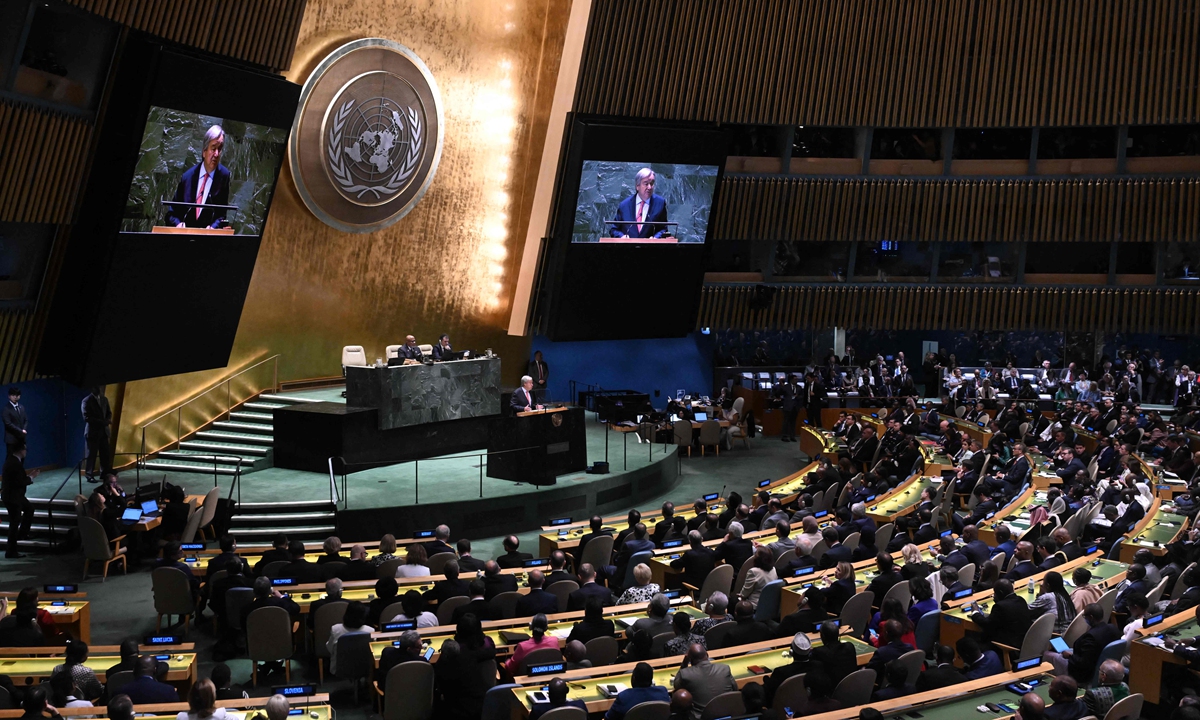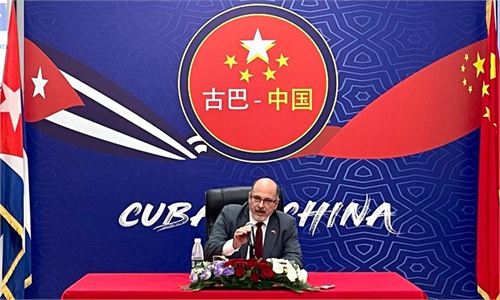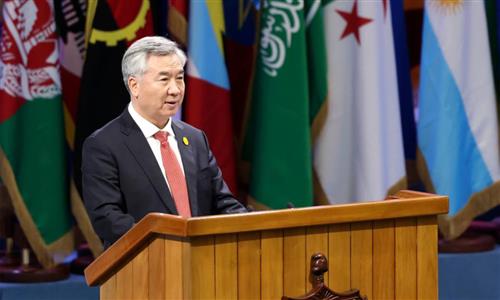UNGA seeks unity to overcome development crisis, divisions
Global South ‘requires bigger say’ amid discrepancy with West

UN Secretary-General Antonio Guterres delivers annual report on the work of the organization ahead of the Assembly's annual General Debate at UN headquarters in New York on September 19, 2023. "Global governance is stuck in time" he said, calling for multilateralism to be remade for the 21st century. Photo: AFP
World leaders are gathering in New York to attend the ongoing 78th session of the United Nations General Assembly (UNGA) high-level week which will last through Friday, seeking unity to overcome crisis.
While countries of the Global South are focused more on development and climate change, echoing the UN's sustainable development goals (SDGs), the US-led West appeared to try to use the multilateral platform to create divisions on the Ukraine crisis, casting a shadow on the first full post-pandemic session.
A major focus of this year's gatherings should be how to accelerate actions on the UN's 2030 Agenda and its SDGs, as some indicators have encountered setbacks with many developing countries facing severe development challenges. However, with the appearance of Ukrainian President Volodymyr Zelensky at the session, the US-led West showed a tendency to bind development issues to geopolitics, forcing other countries to take sides, experts said.
"People are looking to their leaders for a way out of this mess," UN Secretary-General Antonio Guterres said ahead of the annual gathering at the UN General Assembly, the Associated Press reported Tuesday.
This year's weeklong session has 145 leaders scheduled to speak, which is a large number that reflects the multitude of crises and conflicts, according to the AP report.
Guterres called for actions rather than words to deal with a number of challenges such as worsening climate change, the global cost-of-living crisis and dramatic technological disruptions. The UN chief said geopolitical divisions are undermining the capacity to respond.
Key issues
The world today is being confronted with accelerated changes unseen in a century with various unstable and uncertain factors intertwined. The more complex and grimmer the international situation is, the more necessary it is to uphold genuine multilateralism and the more the world needs a strong UN, Chinese Vice President Han Zheng told Guterres on the sidelines of the UNGA on Monday, as reported by the Xinhua News Agency.
China will, as always, be a builder of world peace, a contributor to global development and a defender of the international order, and support the UN in playing a central role in international affairs, Han said.
Some Western media said that the absence of leaders from the four permanent members of the UN Security Council has resulted in complaints from developing countries, casting a shadow over the influence of the UN platform.
Citing Guterres who said he cares less about who comes to New York and more about what gets done, especially to revive the lagging SDGs, Tang Bei, an associate professor at the school of international relations and public affairs at Shanghai International Studies University, noted on Tuesday it is more important to see how governments fulfill their promises.
In fact, besides the UNGA, it is hard to imagine any other international organization or international conference that could gather so many leaders of so many countries, Tang told the Global Times. "This shows that the UN and multilateralism are still very important."
"How to build consensus and enhance confidence has become a core concern of this year's UNGA and we need to focus more on how to accelerate actions on SDGs, when there has been stagnation or regression on some indicators," Song Wei, a professor at the School of International Relations and Diplomacy at Beijing Foreign Studies University, told the Global Times on Tuesday.
The vision of building a community with a shared future for mankind, the Belt and Road Initiative, the Global Development Initiative, the Global Security Initiative and the Global Civilization Initiative - proposed by Chinese President Xi Jinping - are highly aligned with the ideals and goals of the United Nations, and have been widely recognized and actively supported by the international community, Han said.
However, Western countries, particularly the US, seek to make the Ukraine crisis the center of the UNGA, tainting the event with "color of geopolitical contention" and aggravating divisions, Song said.
US President Joe Biden is set to address the UNGA on Tuesday US time, where he plans to "promote democracy" and advocate for "increased support for Ukraine," CNBC reported. The US media also pointed out that the absence of the top Chinese and Russian leaders "gives Biden an opening to advance ties" between the US and smaller, developing nations.
Besides Biden, Zelensky is also scheduled to speak to world leaders at the session opening on Tuesday, which is also his first in-person appearance at this international gathering, the Washington Post said.
"The US-led West seeks to use the UN platform to consolidate different divisions on the Ukraine crisis: Support Ukraine or condemn Russia. But it's worth noting that the Ukraine crisis was fueled by the US itself and the US has been trying to shift the blame to other countries," Li Haidong, a professor at the China Foreign Affairs University, told the Global Times on Tuesday.
The vast majority of countries, especially developing ones, do not want to be kidnapped to take sides on the Ukraine crisis, and they hope to use the UN platform to tackle development issues instead of turning the assembly into a geopolitical battleground, Li said.
Yet some experts noted the Ukraine crisis is very closely related to the global food issues and energy issues; without Ukraine, discussing sustainable development is probably unlikely.
"However, the Ukraine crisis should not be the only issue of concern on the UN platform or make the resolution of this issue a prerequisite for discussing other issues," Tang Bei stressed.
Global South in focus
The discrepancy and sometimes tensions between the Western world and the Global South were a major factor in the planning for the gathering this year, media reported. The US and its European allies "have grown weary of Russia and China luring these countries out of the Western orbit and are determined to strengthen relations with the developing world," New York Times reported.
The differences between the West and the Global South are not a new topic, but this year, the "Global South" has really become a buzzword.
"The increasing presence of the Global South and collective rise of emerging economies have changed the pattern of global governance to a large extent, and also prompted great political and diplomatic anxiety in the West," Tang said. "Global South countries are playing a bigger role in global governance and demanding a bigger say."
With the expansion of the BRICS, emerging major powers share a common stance, which has also objectively been forcing the reform and optimization of the global governance system to adapt to the new global pattern, Tang noted.



